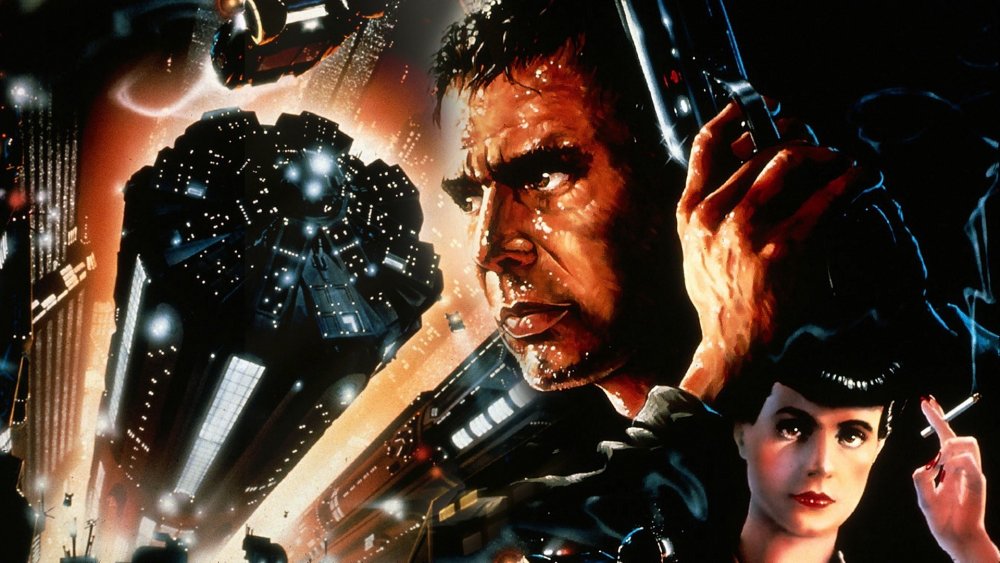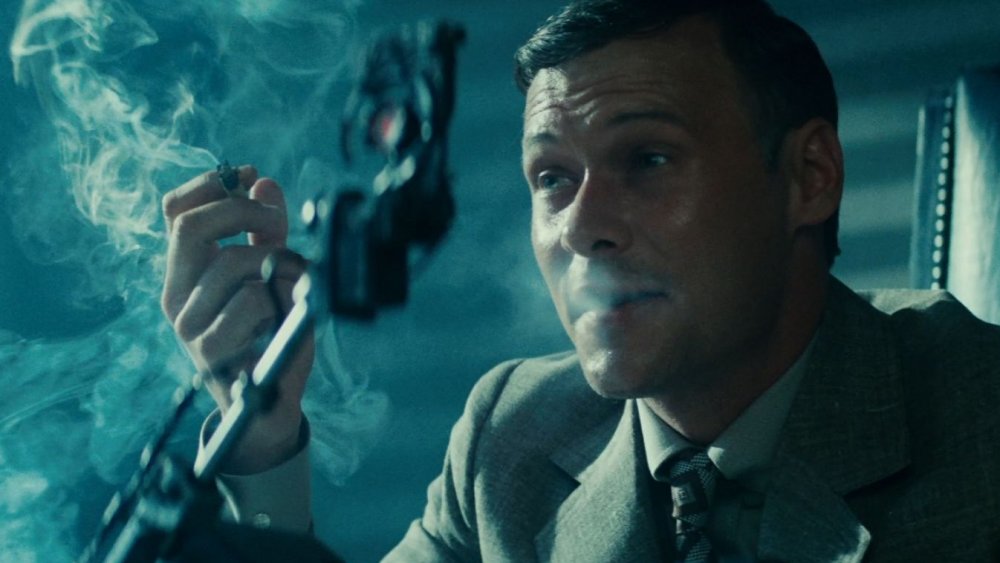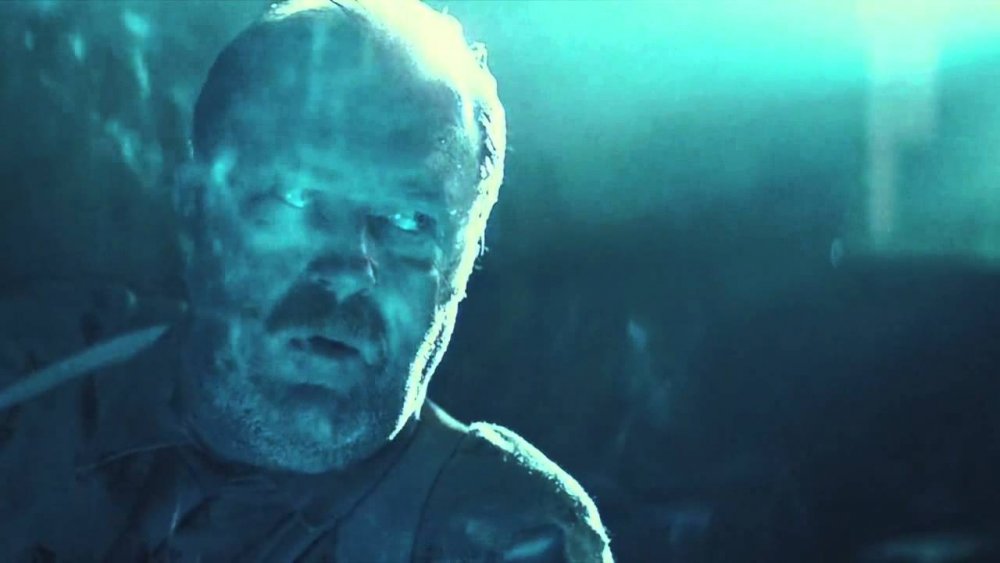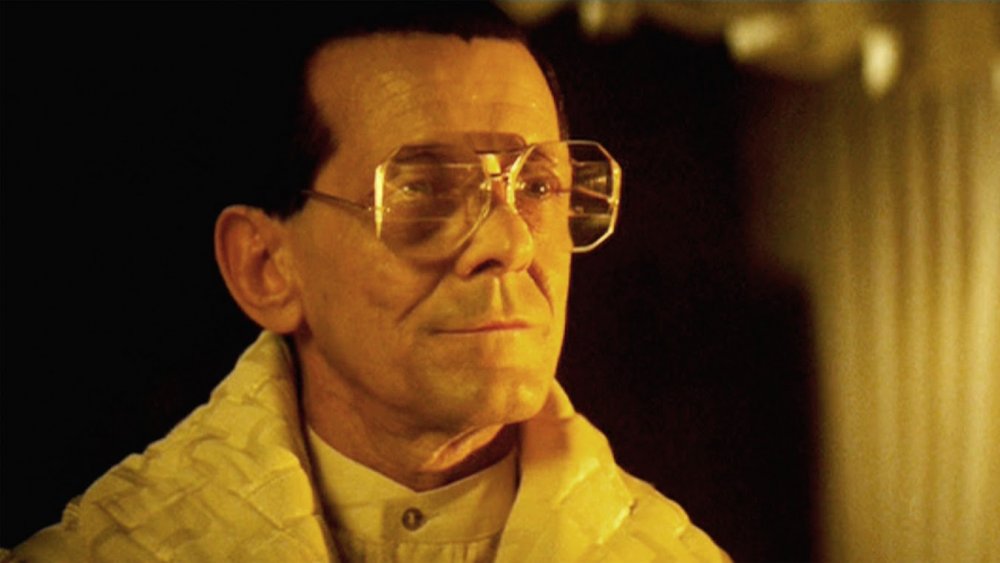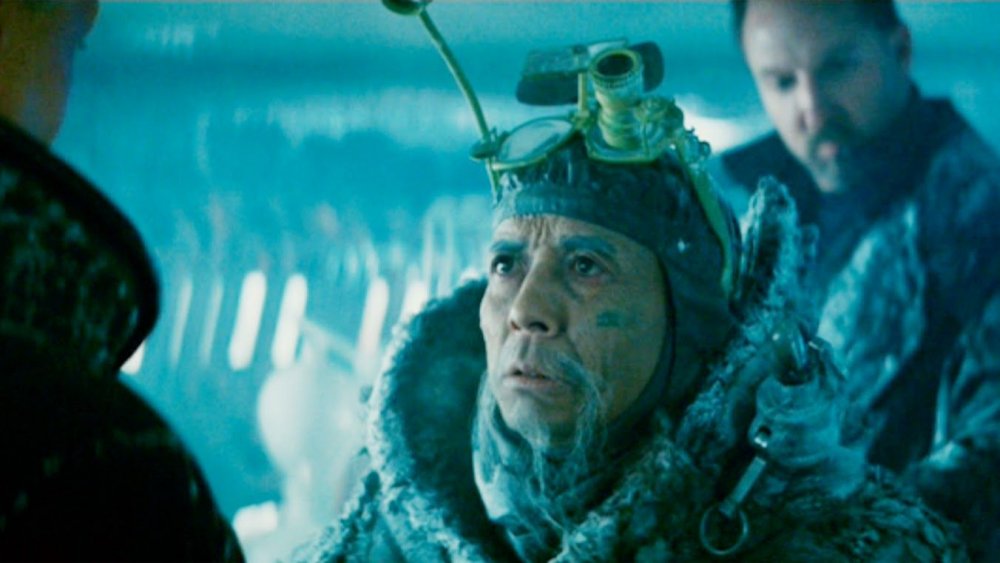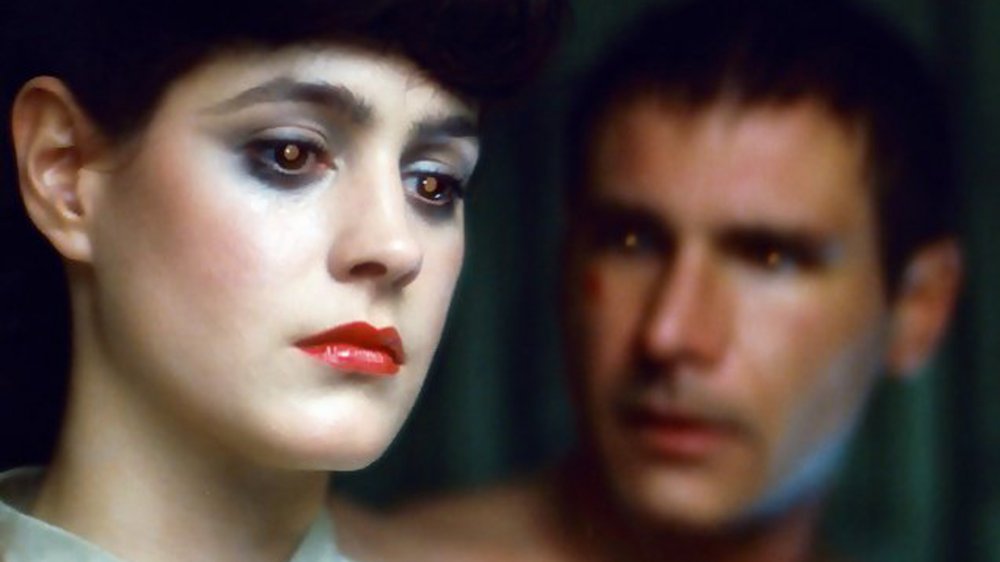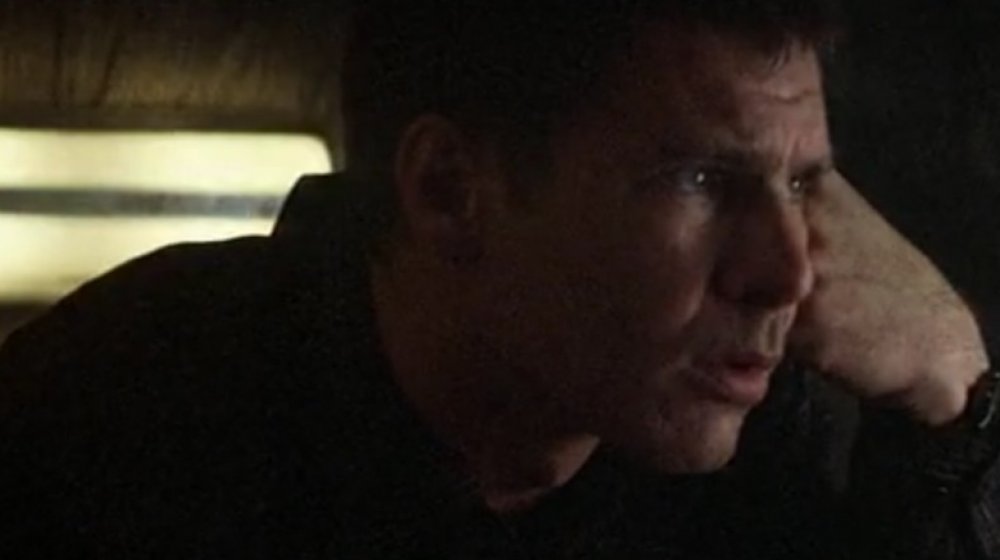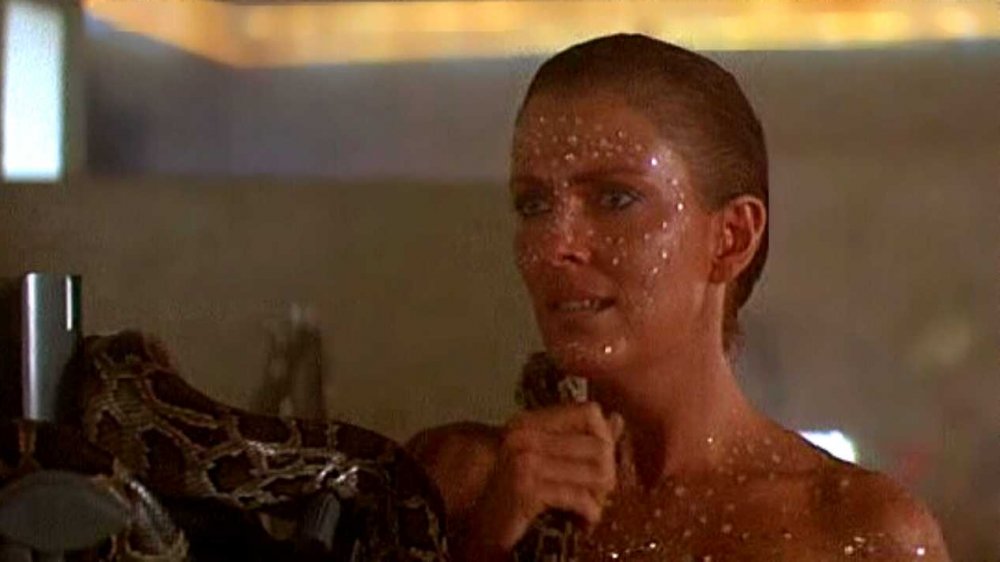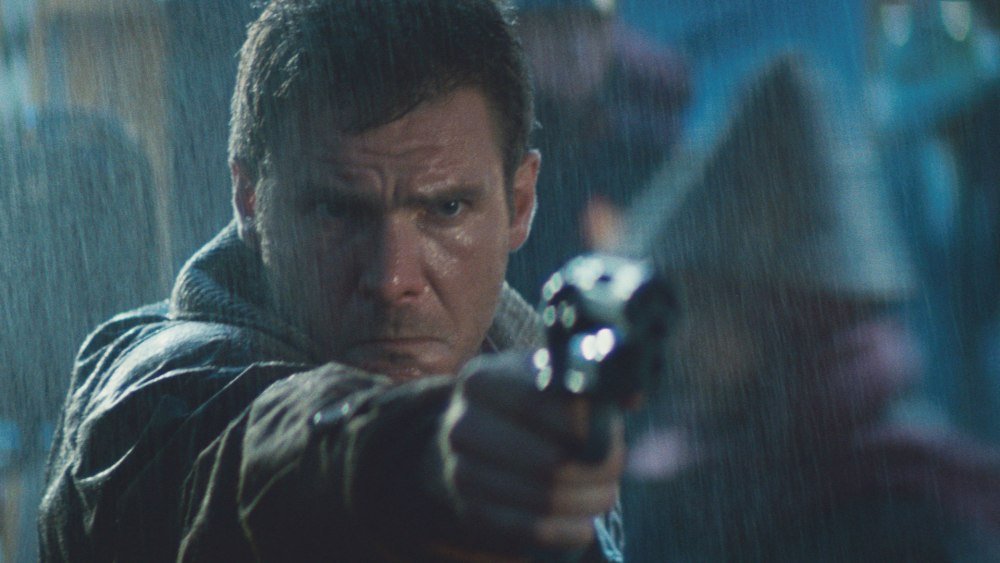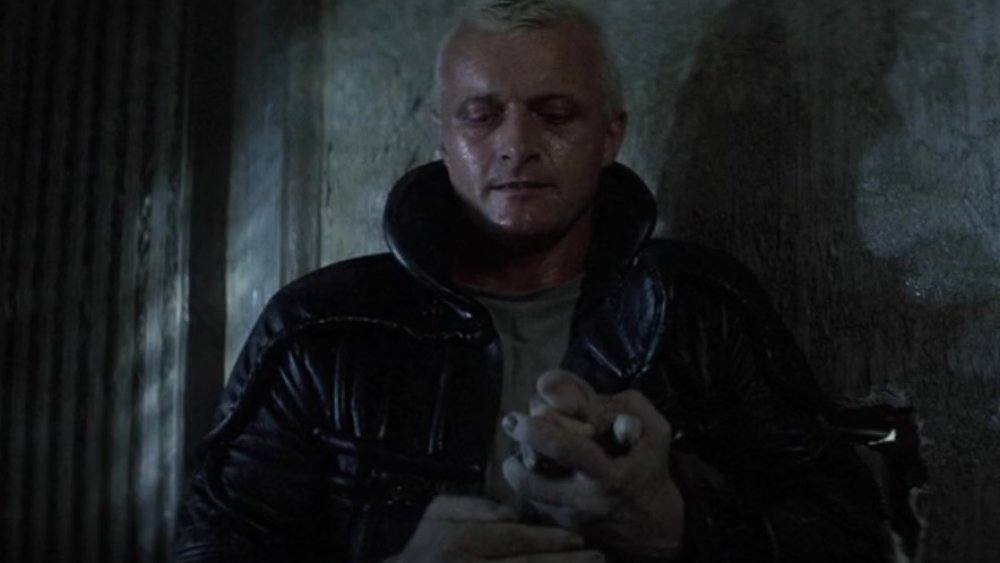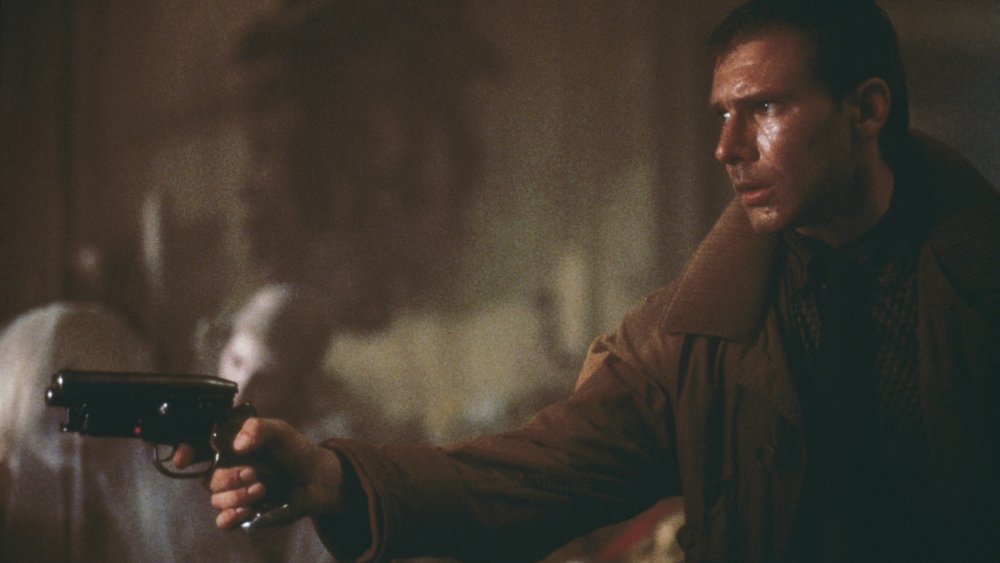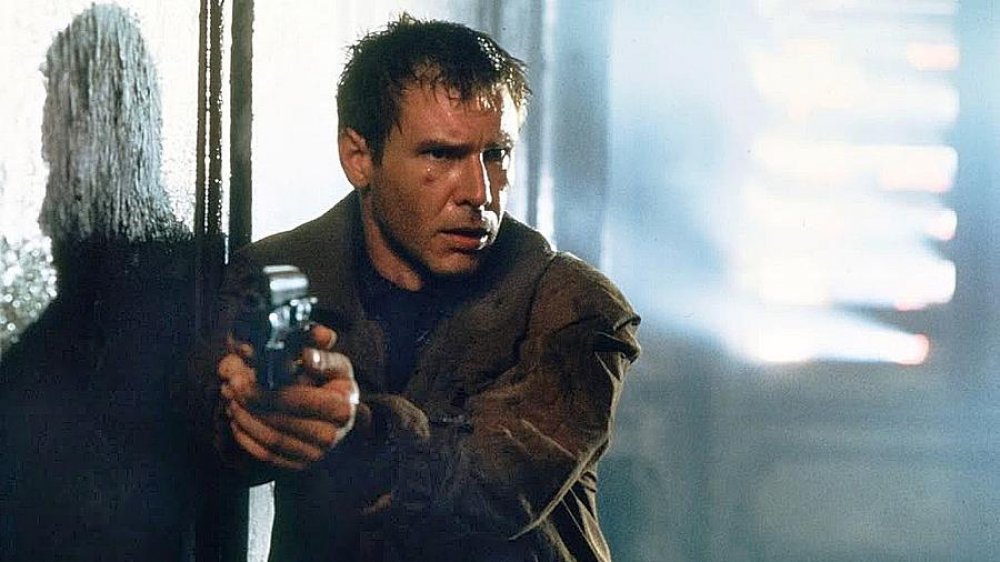Dumb Things In Blade Runner Everyone Ignored
Based loosely only Philip K. Dick's 1968 novel Do Androids Dream of Electric Sheep?, 1982's Blade Runner is a science fiction cinematic classic. Starring Harrison Ford as Deckard — a police officer tasked with killing runaway replicants, artificial lifeforms that look and act like humans – Blade Runner stands up better than most sci-fi films of the '80s. Visually, it's a testament to the notion that artistry is more important than special effects wizardry, as it's still gorgeous to look at even though director Ridley Scott didn't have the CGI technology available today. Like Terminator, it deals with the idea of artificial intelligence in conflict with humanity, but — particularly with the final, unforgettable speech of its tragic villain Roy Batty (Rutger Hauer) – Blade Runner transcends the human vs. robot conflict and asks bigger questions about the nature of life itself.
All of which is to say that when it comes to Blade Runner, we're fans. But just like Roy Batty and his crew of renegade replicants, nothing made by people is perfect — and that includes Blade Runner. Looking back at the film with a critical eye, there are a lot of things the characters do that don't make a lot of sense, particularly when it comes to Deckard. There's also a lot about the technology of the time and about the Tyrell Corporation that's poorly defined and makes certain details questionable. For specifics, here are dumb things in Blade Runner everyone ignored.
A couple of things about Blade Runner's first VK test scene don't make sense
There are a couple of questionable details about that first VK (Voight-Kampff) test scene with Deckard's colleague Holden (Morgan Paull), ending with Holden getting shot twice by the replicant Leon (Brion James).
First there's Holden's response to Leon. At first he seems bored and a little annoyed by Leon, who's clearly nervous and keeps interrupting Holden. It isn't until Leon freaks out at the hypothetical question about allowing a turtle to bake to death in the desert that Holden's attitude changes. Holden clearly sees something alarming about Leon's response. Whether he just strongly suspects Leon, or simply knows at that moment that Leon is a replicant, we'll never know. But regardless, he doesn't do anything about it. At the very least, he has a strong suspicion, yet he just stamps out his cigarette and keeps going with the test. Which, for a guy whose whole job is to kill replicants like Leon, is kind of strange.
Second, there's the very fact that Leon gets a gun into the interview. From what we hear from Bryant (M. Emmett Walsh), we know Leon is a new employee and the interview is taking place a couple of days after six replicants broke into the Tyrell Corporation. Yet a pretty dumb guy gets a gun past security and just carries it around during his work day?
Blade Runner's missing replicant
There's at least one missing replicant in Blade Runner. Kind of.
In the original theatrical release of the film, Bryant tells Deckard that there were originally six renegade replicants and that one got "fried" while breaking into the Tyrell Corporation. You don't need to be a genius to figure out there's a problem here. That should leave five replicants, but there are only four — Roy, Leon, Pris (Daryl Hannah), and Zhora (Joanna Cassidy).
Apparently, there was originally supposed to be another replicant. Earlier versions of the script included a "nanny"-like character named Mary who would either die early in the film or join Pris and Roy in JF Sebastian's apartment. Mary didn't make it to the theatrical version of Blade Runner, but Bryant's line of dialogue wasn't fixed to reflect that until the 2007 "Final Cut" release of the film. In the Final Cut, M. Emmett Walsh dubbed over his original line to say two replicants, instead of one, got fried at Tyrell.
For a mega-rich company, Tyrell Corporation is pretty ineffective
We don't know a lot about the Tyrell Corporation in Blade Runner, but we know the company is huge and powerful. Their pyramid-like buildings tower over the rest of Los Angeles, and Eldon Tyrell (Joe Turkel) is treated like a god. You get the impression that — on the legal and political side — nothing that happens in Blade Runner happens without Tyrell's say-so. Yet... you're also left with the impression that Tyrell is really bad at being a corrupt, mega-rich corporation.
On one hand, your average gas station has better security than Tyrell. Leon, the least intelligent of the runaway replicants, is able to get a job at Tyrell and carry a gun with him while he works, and that's after he and four other replicants break into the place. Also, it's apparently totally cool for certain employees to visit the CEO's penthouse in the middle of the night to bark chess moves at him.
On the other hand, why is the corporation based on Earth? Tyrell makes human replicants which are illegal on Earth. If your company made something that's illegal in certain states, would you choose one of those states for your headquarters? Also, for the most part the only people left on Earth in Blade Runner are those who can't pass the physical exam for space travel, meaning by basing itself on Earth, Tyrell severely limits its recruitment.
Why does Chew have a storefront?
One of the replicants' first victims is Hannibal Chew (James Hong), a genetic designer who makes replicant eyes for the Tyrell Corporation. Roy and Leon visit him, looking for information to help them get to Tyrell. We never see them kill Chew, but his future doesn't look very bright.
What's strange about the scene is how the replicants manage to get to Chew. The eyemaker has a storefront, complete with a big, glowing eye above the front door. When the replicants enter the building, it seems to be late at night and the front door isn't locked. Regardless of what time it is, however, you have to ask yourself exactly why Chew would have a storefront at all.
While Chew makes the eyes for Tyrell's human replicants, it seems like he's a private contractor rather than an employee — otherwise he'd be working in their building. Still, if he makes all the eyes for Tyrell — which seems to be the case since he knows he made Roy's eyes — how much more work does he need? And even if he does need more work, why would he have a storefront? What's he looking for? Foot traffic? The random tourist who needs a replicant eye?
The relationship between Deckard and Rachael is bizarre
There are a lot of things about the relationship that evolves between Deckard and Rachael (Sean Young) that are just plain bizarre.
That there is any interaction between them after Deckard gives Rachael the VK test is strange to begin with. She visits him at his apartment after Tyrell tells her she's a replicant to try to convince him that it's not true. At this point, she hasn't fully accepted the truth but she knows Deckard thinks she's a replicant, and Deckard's job is to kill replicants. So she pays him a visit? Not to mention the way she announces her presence — by lurking wordlessly in the shadows in the corner of Deckard's elevator — seems like a really good way to get herself killed.
Most disturbingly, there's the way Deckard "seduces" Rachael, if you can even call it that. She tries to leave his apartment and he slams the door shut, refusing to let her leave. Then he grabs her and throws her against the wall, forces her to kiss him, and tells her what he wants her to say to him. This would be disturbing in any circumstance. But it's particularly disturbing when you remember Rachael is still wrestling with the notion that she's a replicant, and here's Deckard treating her exactly like a replicant. He treats her like a toy — like the "pleasure" Pris is designed for — telling her what to say and do.
In Blade Runner, photographs work weird
One of the biggest head-scratching scenes in Blade Runner is the scene that gives Deckard his one and only lead — the image of Zhora resting that he finds in one of Leon's photos.
Zhora isn't in the photo at all... at least not at first. With a few drinks in him, Deckard puts the photo in some kind of high-tech photograph analyzer and with it he's able to do something that shouldn't be possible. A mirror is in the photograph, and by focusing on the mirror he's able to do something he shouldn't be able to do — to look at it from a different angle, as if he were there in the room, and find Zhora lounging in the reflection. In a photograph, a mirror no longer has a reflection. It's a two-dimensional image, just like everything else in the photo.
Obviously, Blade Runner is set in the future and we're supposed to expect technology capable of more than what we have, but technology like this needs to be explained before it can be believed. Something like flying cars is simple enough to just expect the audience to accept it and move on. But a technology that allows you to step into a photograph like you were actually there? We need a little warning for that to be believable.
For a replicant in hiding, Zora picks a dumb job
When you're a replicant on Earth, everyone's a potential enemy. You have to be careful. You need to blend in and not give away what or who you are. You need to keep a low profile. You need to... become an exotic dancer with a very unique and memorable hook in one of LA's most popular nightclubs?
That's where Deckard finds Zhora, the first replicant he kills. He finds scales in Leon's bathtub, spots the scales again in one of Leon's photos, and some footwork in the street marketplace leads him to the man who made the snake the scales come from. The trail ends with Taffey Lewis (Hy Pyke), whose club patrons stand shoulder-to-shoulder to see Zhora dance, and all dress in fancy and expensive clothes. Taffey Lewis' place seems like the place to be on a Friday night, and the absolute last place to be if you're a replicant on the run.
Zhora's choice of employment is even more inexplicable when you consider what Bryant says. The police captain tells Deckard she's "trained for an off-world kick murder squad." That training, you would think, might include lessons on how to lay low and to not make yourself as visible as possible. Zhora should be one of the replicants' rocks, but she winds up being their weakest link.
Deckard isn't very good at being a cop
Deckard is a flawed character — and in particular, he's an absolutely horrible cop.
Deckard never calls for any kind of backup, even when he has no idea what's waiting for him inside the Bradbury Apartments at the end. Pris and Roy could both be there, or they could both be no-shows. They could be unarmed or have an arsenal. He calls from his car so he suspects Pris is there, but he doesn't know for sure. He has no idea and yet he goes in alone, with nothing but one handgun for support, even though he actually talks to a cop right beforehand (the one who threatens to arrest him for loitering). Nor does he seem to carry any kind of communications device on him to call the police force — something everyday cops in 1982 would have on them at all times.
When Leon attacks him on the street, he doesn't bother calling out for cops, even though we just watched him walk through a big crowd of them. He doesn't call for help in any way — his only saving grace is Rachael showing up and shooting Leon.
Not to mention that if Deckard's giving you trouble, it doesn't take much to get him off your back. When he's grilling Taffey Lewis in the Snake Pit, the owner gets him a drink on the house, and that's all it takes to put a leash on him.
In Blade Runner's final confrontation, the replicants don't make great choices
In their final confrontation with Deckard, Pris and Roy make some weird choices.
Pris could easily have killed Deckard. After Pris surprises Deckard, she drops him to the floor where he's clearly stunned. Rather than finishing him off, Pris sprints away to set herself up for a fancy gymnastics move that ends with her getting a hole blown through her torso. What's the point of this? Deckard was on the ground, helpless. Setting up the fancy move just gives him time to recover and get good aim. There are no referees nearby who are going to hold up "9.9" and "9.8" scores for a good landing. Just break his neck like a good replicant.
Then there's Roy. Now, as he's battling Deckard, Roy is mourning for his friends as well as dealing with his inevitable death, which is minutes away. So we can forgive a lot. Obviously, there are a few times when he could kill Deckard but doesn't, but we don't see that as a fault because he's trying to be "sportsman-like" and have fun in his final moments.
But it's hard not to take issue with the way he breaks Deckard's fingers. He breaks one finger and says it's for Zhora. He breaks another and says it's for Pris. And... Leon? Hello, Leon? No finger-breaking for Leon? Granted, Rachael killed Leon, but Roy has no way of knowing that. Come on, Roy.
In Blade Runner's final confrontation, Deckard doesn't make great choices
Deckard makes some big mistakes in his final confrontation with Roy and Pris in the Bradbury Apartments, some of which are hard to imagine coming from a guy who's supposed to be L.A.'s best Blade Runner.
First, there's his discovery of Pris. Disguising herself as one of JF Sebastian's many replicant toys is a stroke of genius on Pris' part, and at first it works. Eventually, Deckard spots her and is suspicious of the prone replicant — but it takes him a while. Particularly when you consider he's been reviewing all the information on the replicants so obsessively. In spite of the makeup and the veil, you'd think Deckard would recognize her right away.
Then there's the way Deckard drops his gun and opts to keep scurrying up the apartment walls rather than return to the floor for the gun. In the end, obviously, it doesn't matter because Roy spares Deckard, but Deckard doesn't know that, and from his point of view, his gun is the only advantage he has. Sure, he can run, but Roy's stronger and faster. He can't go anywhere Roy can't go, or where Roy can't get to a lot easier. Letting that gun go is the dumbest move Deckard makes in the entire film.
According to Blade Runner's director, Deckard makes less sense than we thought
For years, fans theorized that Deckard is, like Rachael a replicant. Speaking with Digital Spy in 2014, Blade Runner director Ridley Scott made it perfectly clear what he thought, saying, "[Deckard] is definitely a replicant." If we assume this is true, then Deckard's character makes no sense at all. At least, not from a pragmatic point of view.
What would be the point of a replicant who is also a Blade Runner? Well, first of all replicants have superior physical abilities, so a replicant Blade Runner could presumably match those abilities. Second, a replicant would be able to better anticipate how other replicants would act — kind of like the old "it takes a thief to catch a thief" adage.
The problem with the "it takes a thief" wisdom is that if Deckard is a replicant, he isn't aware of it, and therefore being one gives him no special insights. A thief can catch another thief because they know what it's like to be a thief. A replicant who doesn't know they're a replicant has no idea what it's like to be one. And, as we see in every single one of his physical confrontations with the replicants in Blade Runner, if Deckard is a replicant then he doesn't share their physical attributes.
So, if Scott is to be believed and Deckard is a replicant, he was either made by a practical joker or the dumbest Tyrell employee they had.
